Gran Torino Blu-ray Movie
HomeGran Torino Blu-ray Movie 
Warner Bros. | 2008 | 117 min | Rated R | Jun 09, 2009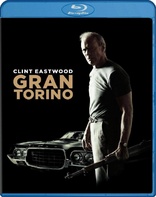
Movie rating
8.1 | / 10 |
Blu-ray rating
| Users | 4.4 | |
| Reviewer | 3.5 | |
| Overall | 4.0 |
Overview
Gran Torino (2008)
A disgruntled Korean War vet, Walt Kowalski, sets out to reform his neighbor, a young Hmong teenager, who tried to steal Kowalski's prized possession: his 1972 Gran Torino.
Starring: Clint Eastwood, Christopher Carley, Bee Vang, Ahney Her, Brian HaleyDirector: Clint Eastwood
| Crime | Uncertain |
| Drama | Uncertain |
| Coming of age | Uncertain |
Specifications
Video
Video codec: VC-1
Video resolution: 1080p
Aspect ratio: 2.40:1
Original aspect ratio: 2.39:1
Audio
English: Dolby TrueHD 5.1 (48kHz, 16-bit)
English: Dolby Digital 5.1 (640 kbps)
French (Canada): Dolby Digital 5.1
Portuguese: Dolby Digital 5.1
Spanish: Dolby Digital 5.1 (640 kbps)
Subtitles
English SDH, French, Portuguese, Spanish
Discs
50GB Blu-ray Disc
Single disc (1 BD)
BD-Live
Packaging
Slipcover in original pressing
Playback
Region free
Review
Rating summary
| Movie | 5.0 | |
| Video | 4.0 | |
| Audio | 3.5 | |
| Extras | 1.5 | |
| Overall | 3.5 |
Gran Torino Blu-ray Movie Review
Though passed over come Oscar time, 'Gran Torino' delivers a strong emotional core.
Reviewed by Martin Liebman May 26, 2009Sounds like you know a lot more about death than you do living.
Any list of the top directors working today that doesn't at least consider the names Spielberg,
Scorsese, Boyle, Coen, Nolan, and Eastwood is suspect at best. Of those names, though, only
one has enjoyed an equal amount of success on both sides of the camera -- Clint Eastwood.
Perhaps the most well-rounded individual in the history of Tinseltown, Eastwood's name appears
regularly come Oscar night, likely to be found attached to some project he either directed or
starred in -- or both. Nominated twice for Best Director and Best Actor for the same films (Million Dollar Baby and
Unforgiven) and
nominated twice more for Best Director for his efforts on Letters from Iwo
Jima and Mystic River (and all four films nominated for Best Picture), Eastwood
walked away with two trophies each for Baby and
Unforgiven. Besides the tremendous success of the films, another common thread
may be found in Eastwood's long history with Warner Brothers Pictures, each film noted above
distributed by
the storied studio. The relationship spans decades, the actor and studio teaming up for films like
the Dirty Harry quintet,
Every Which Way But
Loose, and The Guantlet. In
their latest
collaborative effort, and in the tradition of the greats of the past decade, Gran
Torino features Eastwood serving as both director and leading man, the film surprisingly
failing to earn any Oscar nominations, although it certainly proves just as worthy of the honor as
many previous Eastwood/Warner Brothers outing.

Clint Eastwood scowls yet again in 'Gran Torino.'
Kowalski (Eastwood), a grizzled Korean War veteran, racist, and a man intolerant of change, has just lost his wife to the afterlife. In the face of his displeasure with the ways of the world, including the lifestyles and personalities of his own children and grandchildren, Kowalski maintains a set of core values, including dignity and honor. In his family and in his surroundings, he sees his values spurned everywhere he looks -- in his granddaughter's dress, his neighborhood's many unkempt yards, and even in the very populace that now resides on his block. The stubborn Kowalski refuses to move on when his old neighborhood crumbles around him, when gangs roam the streets, and "undesirable" non-white families dwell in the disheveled houses up and down his once-peaceful and well-manicured street. Amidst the chaos of the world around him, he maintains a pristine 1972 Ford Gran Torino, a vehicle he personally helped build during his 50 years on the Ford assembly line.
When his young and confused neighbor, Thao Vang Lor (Bee Vang), attempts to steal the car as part of a gang initiation, Kowalski scares the boy away with his 1950s vintage M1 Garand rifle. Later, when Thao resists the gang's attempt to get him in further trouble and the conflict spills over onto Kowalski's property, he again turns to the Garand, this time threatening the gang members and, unwittingly, earning the appreciation of both Thao's family, including his sister Sue (Ahney Her), and the entire block. As penance for his attempt to steal the car, Thao is bound by tradition to perform work for Kowalski, who reluctantly accepts but soon comes to appreciate all the boy has to offer, including a strong work ethic and a personable demeanor. Also befriending the entire Lor family, Kowalski begins the slow process of defeating his outward prejudices while doing all he can to keep Thao out of trouble that continues to seek him out despite his changed ways and guidance under the wing of his newfound friend.
Sometimes a movie needs not all of those more traditional bullet points that, when properly assembled, signify what many may hail as a "success," a "hit," or even a "masterpiece" of moviemaking. Sometimes a movie need only a single element -- in the case of Gran Torino an incredibly moving, uplifting, emotional core -- to elevate it well above its peers. Indeed, Gran Torino, analyzed from a more traditional point-of-view, lags behind other films of a dramatic nature with somewhat unpolished acting from its supporting players, a pace that sometimes seems to drag, and the absence of a traditional score. Nevertheless, the film overcomes its shortcomings because it's not about its characters, its length, or its soundtrack. It's about emotion, about living, about the human condition itself and its power to overcome any obstacle, whether on the field of battle in a distant land, in a decaying neighborhood, or most importantly, in a man's soul. Gran Torino is a film about a journey that reflects on a microcosm of humanity, where a changing world and a stubborn and hardened soul collide. It is a film where acceptance, trust, love, and sacrifice know not the boundaries of selfishness but instead the gift of selflessness.
Gran Torino tackles complex issues with an admirable simplicity, the film's straightforward and blunt approach its greatest asset. Clint Eastwood's character -- reflective of that of a man that seems both angry about his surroundings yet content in the comfort of his own small slice of real-estate -- allows the world to pass by him with only a grimace and a growl; his intent is not to change things but only maintain his own sanity in the comfort of his own home. Nevertheless, when the wrongs of the world -- both real and imagined -- interfere with his distinct yet comfortable way of life, he takes immediate action that grows into something more where he discovers that not everything is as cut-and-dry as black and white, past and present, or clean and unkempt. It's a lesson as old, it seems, as man himself, though rarely has it been portrayed more effectively and with meaning than it is in Gran Torino.
Ultimately, the theme of the film revolves around sacrifice. Kowalski is seen as a hero by the very people he despises. At first, he fights not for their cause but rather for himself, his actions seen as a heroic gesture by those he does not understand nor cares to know. His acceptance of their traditional gesture of overwhelming generosity lies not with his eagerness to take but rather in their persistence to give. In return, and over time, the roles become reversed, as Kolwaski finds himself a mentor to a troubled young man in need of guidance, of a father figure, even if that mentor decries the young man's very existence -- his skin tone, the shape of his eye, his very ancestry. In Thao, Kowalski finds a man much like himself, rough around the edges but eager to be led down the straight and narrow path, the cornerstone of Kowalski's very existence. Through working with Thao, whom he comes to love as a son, Kowalski begins to see past superficial prejudices and instead learns to differentiate between appearance and character, coming to learn that a man is not the sum of his physical appearance.
Gran Torino Blu-ray Movie, Video Quality 
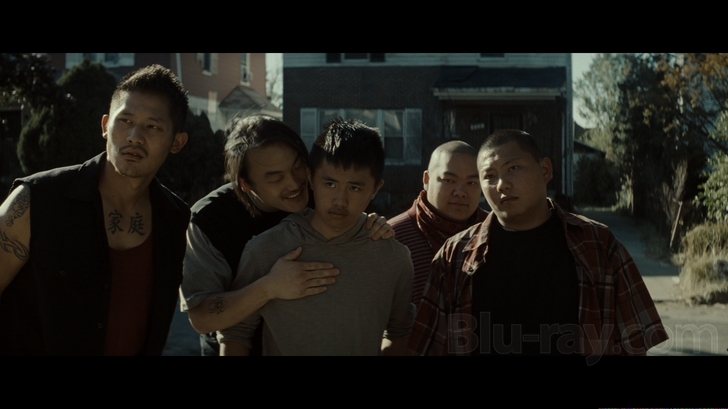
Gran Torino premieres on Blu-ray with a fine 1080p, 2.40:1-framed transfer. Colors throughout appear somewhat dull with perhaps just the slightest hint towards sepia, but are nevertheless stable and well-rendered. Whether the reddish-brown bricks that make up parts of the neighborhood houses or the varied shades of green that adorn the foliage seen up and down the street or in Kowalski's backyard, the image offers a spectrum of colors that look nice even in context of the film's slightly vintage look. Detail impresses, too, with objects both near- and far-frame revealing fine textures and nuances that demonstrate the superiority of the image. Depth, too, impresses, the film appearing spacious and realistic in most every shot. Generally, the transfer appears sharp and clear, with only a few shots taking on a hint of softness. Blacks are generally inky and true, flesh tones take on a natural appearance in the context of the film's intended look, but a few jagged edges appear sporadically. Fine grain appears visible yet minimal in presence at normal viewing distances. The image reflects the tone of the picture, and like every other aspect of the filmmaking process, effortlessly fading into the background in favor of the film's superb emotional core.
Gran Torino Blu-ray Movie, Audio Quality 
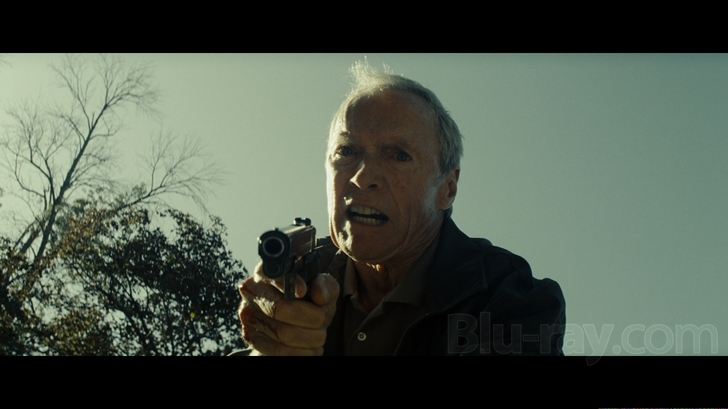
Gran Torino revs its engines and reveals a Dolby TrueHD 5.1 lossless soundtrack. This is a quiet, reserved soundtrack, where even the dialogue requires a bit of effort to make out at reference volume. Though generally clear, a few scenes, such as a conversation between Kowalski and Sue in chapter 17, plays almost like it's been filtered through a tin can. Nevertheless, the rest of the soundtrack delivers a suitable experience, though the amount of information funneled through to the speakers seems minimal compared to most other tracks. The organ music that opens the film inside the church plays with a natural flair, and the priest's words echo pleasantly throughout the cavernous sanctuary. Outdoor scenes throughout the film create an incredibly realistic atmosphere. A dog barks off in the distance; a slight breeze rustles leaves; a police siren screams off to the left of the soundstage. The few gunshots heard throughout the film -- a single shot and two separate barrages -- offer an ample but not completely realistic level of heft and presence. There's not much to the track at all. Like the video, the film's sound design takes a backseat to the emotional core of the film and offers little more than the basic necessities required of it.
Gran Torino Blu-ray Movie, Special Features and Extras 
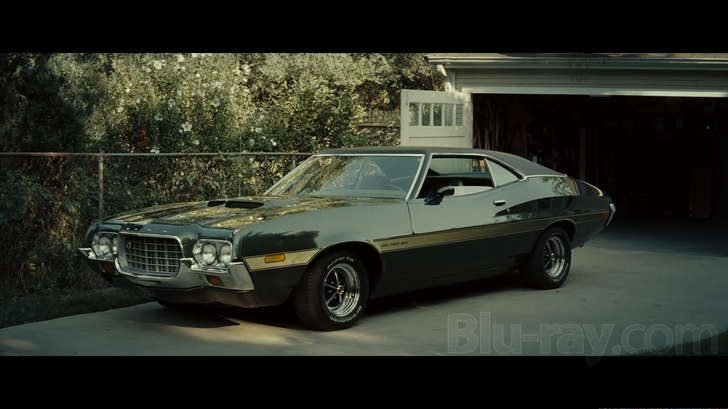
Gran Torino sputters onto Blu-ray with only a few supplements. The Eastwood Way (1080i, 19:17) features cast and crew discussing the entirety of the film, including its themes, the challenges of the roles, the presence of the Hmong people and the insistence that their culture is depicted accurately, casting the roles, and more. Manning the Wheel (1080i, 9:23) examines the history of the car, man's obsession with the automobile, and its role in the film. Gran Torino: More Than a Car (1080i, 3:57) takes another look at the importance of the automobile in society. Finally, this disc features BD-Live (Blu-ray profile 2.0) functionality, though access was prohibited at time of writing. Also included on a second disc is a digital copy of the film. Replayed on a second generation iPod Touch, the video quality reflects that as seen in the film, with a slight sepia tone but strong colors and solid detail. The level of visible blocking remains in-line with the average digital copy. The soundtrack features clear-sounding effects and ambience, but dialogue tends to feature an echoing effect.
Gran Torino Blu-ray Movie, Overall Score and Recommendation 
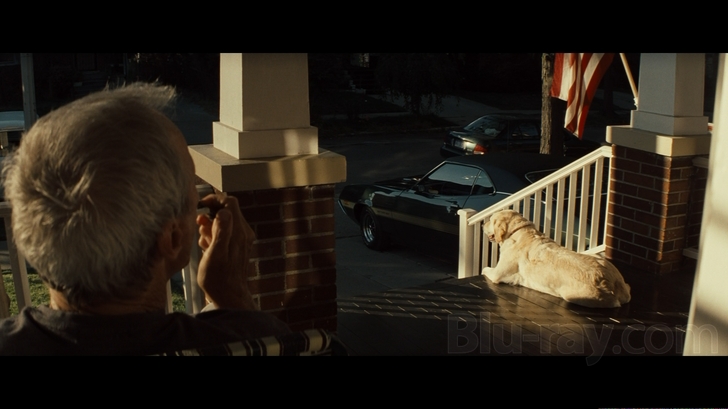
Powerful, moving, and timeless, Gran Torino represents the ultimate in straightforward moviemaking, where theme and emotional context overpower every other facet of the experience. It matters not that Eastwood delivers another exceptional performance on both sides of the camera, that the film features fine cinematography, or that the acting from several players might not be the best ever committed to film. Regardless of its plusses or minuses, the emotional core of Gran Torino conquers all else, for its startlingly simple yet incredibly powerful theme of sacrifice and selflessness, particularly in a world full of selfishness, shines far brighter than any other facet of the film, a symbol of the power of personal, moving, and riveting old-fashioned storytelling. Unfortunately, Warner Brother's Blu-ray release of Gran Torino doesn't quite deliver a satisfying all-around experience. Though the disc features a strong video transfer and a lossless soundtrack that reflects the low-key tone of the film's sound design, it offers only a few filler supplements that only serve to stir the appetite for more in the way of quantity and substance. Nevertheless, the film comes first, and no doubt this one is exceptional. Supported by the good video and audio presentations, Gran Torino comes highly recommended.
Other editions
Gran Torino: Other Editions

Gran Torino
2008

Gran Torino
2008

Gran Torino
2008

Gran Torino
2008

Gran Torino
2008

Gran Torino
2008

Gran Torino
Iconic Moments
2008
Similar titles
Similar titles you might also like

Menace II Society
Director's Cut
1993

Wall Street: Money Never Sleeps
2010

American History X
1998

A Time to Kill
1996

Gangs of New York
Remastered
2002

Clean
2020

Stand Up Guys
2012

Belly 4K
25th Anniversary Edition
1998

Carlito's Way 4K
1993

Falling Down
1993

The Godfather: Part II 4K
1974

Bad Lieutenant: Port of Call New Orleans
2009

Boyz n the Hood
1991

Donnie Brasco
Theatrical Edition
1997

Black Rain
1989

Brick Mansions
2014

Scarface 4K
Gold Edition
1983

The Gambler
2014

Revenge of the Green Dragons
2014

A Bronx Tale 4K
30th Anniversary Limited Collector's Edition | Includes 4 Collectible Postcards
1993